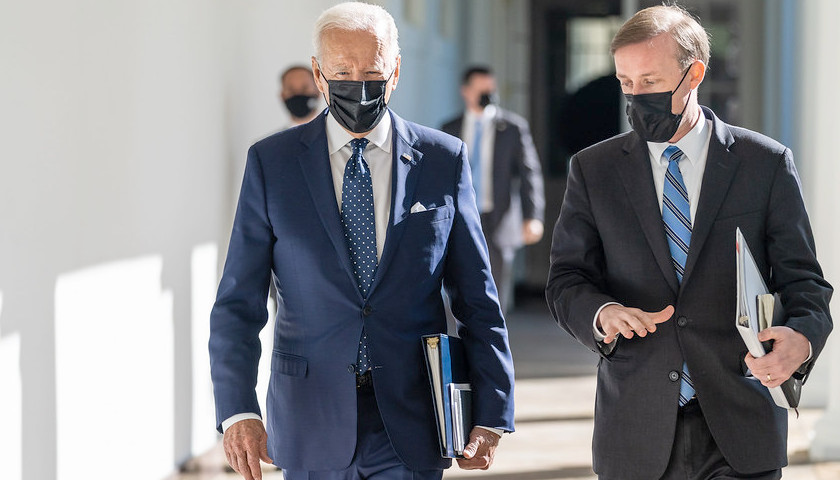by Micaela Burrow
Conflicting goals among administration officials and a lack of tangible solutions may hobble the White House’s long-awaited plan for ensuring U.S. national security in the midst of a rising threat from the Chinese Communist Party (CCP), experts told the Daily Caller News Foundation.
The Biden administration’s National Security Strategy, released Wednesday, proffered a vision for competing with China in technology and military modernization while seeking to cooperate on segments of shared interest, such as drugs and nuclear weapons. While the administration included adequate language to describe the threat China presents to the U.S.-led way of life, the strategy tries to accomplish too much, too late — resulting in an incoherent, poorly fleshed-out plan overburdened by conflicting viewpoints, experts told the Daily Caller News Foundation.
“I think they’re trying to pander to too many audiences,” Walsh told the DCNF, referring to the Biden administration.
 “A hallmark of the Biden approach is the integration of foreign policy and domestic policy,” National Security Adviser Jake Sullivan said in remarks Thursday.
“A hallmark of the Biden approach is the integration of foreign policy and domestic policy,” National Security Adviser Jake Sullivan said in remarks Thursday.
Instead of informing the administration’s attitude toward great power competition, “conflicting interests” among the Democratic party, involving pressure to stifle the skyrocketing cost of living, clamor for a Green New Deal and concernsabout the state of democracy at home and abroad have undermined it, according to Erin Walsh, a senior research fellow at the Heritage Foundation and a member of former President Donald Trump’s National Security Council.
President Joe Biden’s strategy called for modernizing and enhancing the U.S. military deterrent and for reshoring production of critical materials to reduce dependence on China, which the administration pegs as “the only competitor with both the intent and, increasingly, the capability to reshape the international order” across economic, political, security and technological dimensions, according to a fact sheet.
At the same time, it advocated for the U.S. to collaborate with allies with a goal of preserving democratic values, and with malign actors — notably, China — where the U.S. could find common ground. Areas of potential cooperation included climate, nuclear nonproliferation and the global narcotics trade.
What the administration ended up with was a “piece that everybody has a part of, so that everybody wins a prize, rather than the United States having a very clear path on the way forward,” Walsh added.
“They think that this is just competition, and they don’t have any real solutions to deal with it,” Walsh told the DCNF, referring to the Biden administration.
Democratic leaders said the strategy struck an appropriate balance between the persistent danger China poses with other global issues, while highlighting the strength of U.S. industry to outmaneuver the U.S.’ greatest rival. “The administration’s National Security Strategy correctly addresses the immediate challenges to the rules-based international order posed by Russia’s further invasion of Ukraine while also recognizing that the Chinese Communist Party in Beijing presents a wider, more enduring range of challenges,” House Arms Services Committee Chairman Democratic Rep. Adam Smith said to the DCNF.
“The major lines of effort make sense,” Matthew Kroenig, a professor at Georgetown University and Vandenberg Advisory Board member, told the DCNF. “But there is a dangerous ‘say-do gap.’”
For example, China emits more carbon than the U.S. and European Union combined, its sprawling factories increasingly dependent on coal and fossil fuel sources for electricity. Most of the mass-casualty drug, fentanyl, smuggled through the U.S. Southern border originates in China.
China’s neighbor to the east recently declared itself a nuclear power and launched a record number of ballistic and strategic cruise missiles under the Biden administration, explicitly preparing for tactical nuclear use. Yet China has done little to stop North Korean proliferation, Hudson Institute senior fellow and former Trump administration NSC member Nadia Schadlow explained to the DCNF.
Kroenig said the idea that the U.S. could separate malicious CCP activities from areas of mutual interest was “unrealistic.”
“It is like saying we will cooperate with arsonists to stop housefires,” Kroenig added. “The focus on cooperation is being motivated by domestic politics and a desire to appeal to the progressive wing of the democratic party.”
Presidents typically release their National Security Strategies within the first year of arriving in office; however, indications of a coming Russian invasion of Ukraine prompted the Biden administration to rewrite the strategy, accordingto Foreign Policy.
In the intervening months, the U.S. may have run out of time to effectively act against a Chinese threat, Schadlow said.
“Despite their intentions, European allies often struggle to adapt to new challenges in a timely manner,” Schadlow continued.
“It’s been five years since the Trump strategy in 2017 laid out a problem,” said Schadlow, who drafted Trump’s National Security Strategy that focused heavily on the threat from China. “Can we wait another five years?”
Under Chinese President Xi Jinping, the authoritarian regime’s global influence and dominance agenda, including the Belt and Road Initiative and a historic espionage threat not seen since the time of the Soviet Union, has grown more aggressive.
“The terms of our competition with the People’s Republic of China will be set,” said Sullivan on Thursday. “The window of opportunity to deal with shared challenges like climate change will narrow drastically, even as the intensity of those challenges grows.”
– – –
Micaela Burrow is a reporter at Daily Caller News Foundation.








